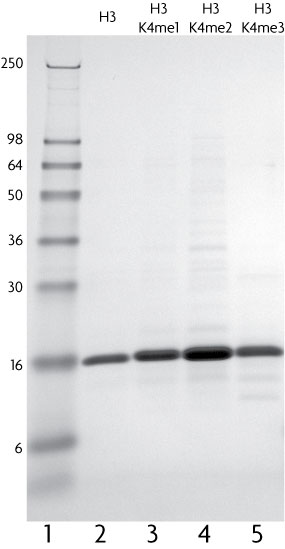Expressed In: E. coli Protein Species: Xenopus
Methylated Lysine Analog
Recombinant Histone H3K4me3 (MLA) has been generated using the patented Methylated Lysine Analog (MLA) technology. In MLA, methylated histones are generated via a chemical alkylation reaction that substitutes a methylated analog of lysine, aminoethylcysteine, for the existing lysine at the desired residue. Aminoethylcysteine is structurally and chemically similar to lysine, though it contains a sulfide substitution in place of the lysine ϒ-methylene. The MLA technique provides precise control over the site and degree of methylation. The MLA technology is covered under U.S. Patent No. 8,278,112.
Contents
A representative Technical Data Sheet (TDS) is provided here. Please refer to the lot-specific TDS you will receive with your order for the lot-specific buffer contents and protein concentration.
Background
Histone H3 is one of the core components of the nucleosome. The nucleosome is the smallest subunit of chromatin and consists of 146 base pairs of DNA wrapped around an octamer of core histone proteins (two each of H2A, H2B, H3 and H4). Histone H1 is a linker protein, present at the interface between the nucleosome core and DNA entry/exit points.
Application Notes
This product has a human version:
Please refer to our alternative products Catalog No. 31278, Catalog No. 31600
Recombinant histones are suitable for use as positive controls in the analysis of histone post-translational modifications, as substrates for histone modification enzymes, or to generate chromatin in vitro.
Protein Details
Recombinant Xenopus laevis Histone H3 trimethyl Lys4 (H3K4me3) is produced in E. coli and purified using FPLC. The protein contains a substitution of cysteine to alanine at amino acid 110. Recombinant methylated histones are specifically methylated via a chemical alkylation reaction that introduces a methyl lysine analog (MLA). This specific chemical treatment enables the site and degree of methylation to be controlled precisely. Each methylation reaction is over 99% complete, as verified by high-resolution ESI-TOF mass spectrometry. Protein concentration was determined using the molar extinction coefficient for Histone H3 and absorbance at 280nm. The recombinant histone is >98% pure by SDS-PAGE. The molecular weight of the recombinant histone is 15,300 Daltons.
References
This product was used in the following publications:
Powers, N.R., et. al. (2016). PLoS Genet. 12(6):e1006146. PMID: 27362481.
Recombinant Histone H3 trimethyl Lys4 analyzed by SDS-PAGE gel.
SDS-PAGE analysis of 1.5 µg Recombinant Histone H3 (C110A) (lane 2), Recombinant Histone H3 monomethyl Lys4 (lane 3), Recombinant Histone H3 dimethyl Lys4 (lane 4), and Recombinant Histone H3 trimethyl Lys4 (lane 5). Molecular weight marker is in lane 1.
Storage
Lyophilized proteins can be stored at -20°C or -80°C, preferably desiccated. Recombinant proteins in solution are temperature sensitive and must be stored at -80°C to prevent degradation. Avoid repeated freeze/thaw cycles and keep on ice when not in storage.
Guarantee
This product is guaranteed for 6 months from date of receipt.
This product is for research use only and is not for use in diagnostic procedures.



